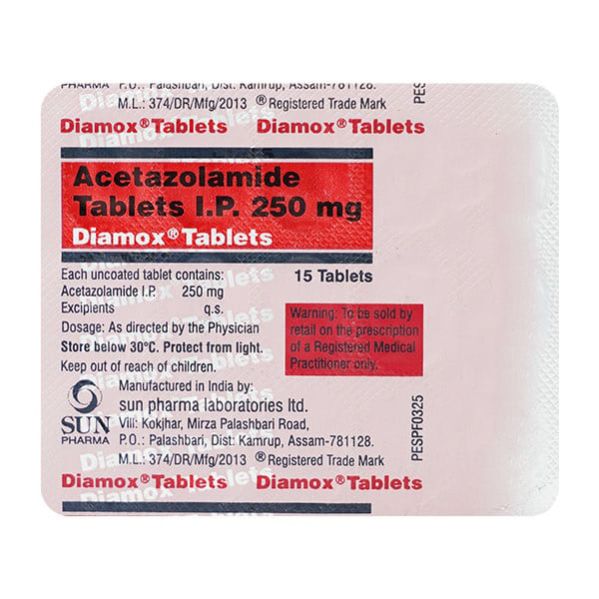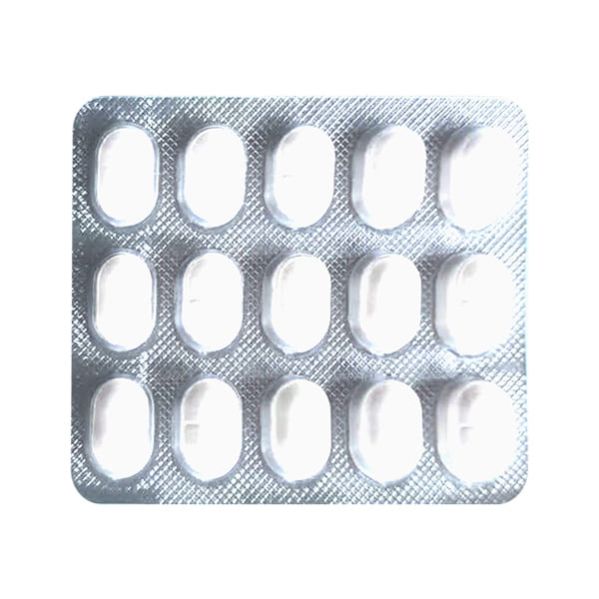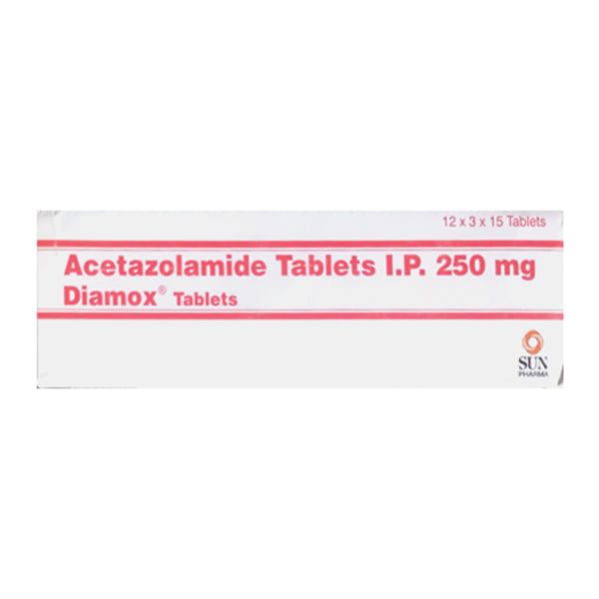Diamox 250mg Tablet 15'S
Acetazolamide 250 mg
₹ 57.00
₹64
(Inclusive of all taxes)
-

No Warranty
-

COD Avilable
-

Non Returnable
-

cancelable
About this item
INTRODUCTION ABOUT DIAMOX 250MG TABLET
DIAMOX 250MG TABLET contains Acetazolamide, which belongs to the group of medicines called Carbonic Anhydrase Inhibitors. It is used in the management of glaucoma, retention of fluids in the body, and epilepsy (fits). Glaucoma is a condition of the eyes that can result in loss of vision and blindness by damaging a nerve in the back of the eye called the optic nerve.
Before starting with the management, your doctor may advise you to undergo some blood tests to check if management with DIAMOX 250MG TABLET is suitable for you. Tell your doctor if you are due to have any medical tests, as DIAMOX 250MG TABLET may interfere with these tests.
Before taking DIAMOX 250MG TABLET, inform your doctor if you have or ever had severe kidney, liver, or lung problems, chronic non-congestive angle closure glaucoma, reduced function of adrenal glands (Addison’s disease), low sodium/potassium levels, or high chlorine levels in the blood.
DIAMOX 250MG TABLET is not recommended for use in pregnancy and should be taken with consultation of a doctor during breastfeeding. In children and adolescents, the correct dose of DIAMOX 250MG TABLET will be decided by the doctor, according to the patient’s body weight.
A small number of people being managed with medicines like DIAMOX 250MG TABLET have had thoughts of harming or killing themselves. If you experience anything like that, immediately contact your doctor. The most common side effects of taking DIAMOX 250MG TABLET are extreme tiredness, nausea, vomiting, stomach pain, and diarrhea. Consult your physician if any of the symptoms worsen over time.
USES OF DIAMOX 250MG TABLET
Manages
- glaucoma
- abnormal fluid retention in the body
- epilepsy
HOW DIAMOX 250MG TABLET WORKS
DIAMOX 250MG TABLET effectively manages glaucoma by blocking an enzyme called carbonic anhydrase that reduces the production of aqueous humor (fluid in the eye) and lowers the intraocular (eye) pressure. It controls epilepsy (fits) by directly blocking an enzyme in the central nervous system, hence increasing the oxygen level of the body. DIAMOX 250MG TABLET also acts on certain parts of the kidneys, which increases the excretion of certain substances through urine, which helps in the release of retained fluid in the body and hence relieves fluid retention.
DIRECTIONS FOR USE
Take DIAMOX 250MG TABLET as advised by your physician. Swallow the medicine with a glass of water. Do not crush or chew it. Your doctor will decide the correct dose and duration for you depending on your age, body weight, and disease condition.
SIDE EFFECTS OF DIAMOX 250MG TABLET
COMMON
- extreme tiredness
- nausea, vomiting
- stomach pain, diarrhea
- tingling or pricking sensation
UNCOMMON
- kidney stones
RARE
- skin rashes, including an increased sunlight sensitivity
Stop taking DIAMOX 250MG TABLET if you experience any of the following symptoms and contact your doctor immediately:
- sudden wheezing or difficulty in breathing
- swelling of eyelids, lips, or face
- rash or itching (affecting your whole body)
- effect on blood cells (sore throat or fever, tiny reddish-purple spots on skin or bruises, weak muscles, fits)
- kidney problem (difficulty in urination, pain in lower back, burning sensation or pain while passing urine, stop passing urine, have blood in urine)
- liver problem (pale, black, or tarry stools, slight yellowness of skin or eyes)
- thoughts of harming or killing oneself
HOW TO MANAGE SIDE EFFECTS
Diarrhea
Drinking plenty of water and other electrolyte-balanced fluids (like diluted fruit juices, broths, sports drinks, and caffeine-free sodas) will help with hydration. Try to eat less high-fat foods, like meat, eggs, and cheese. Exercise more regularly. If the diarrhea persists, contact your doctor.
Nausea And Vomiting
Take DIAMOX 250MG TABLET with, or just after meals. Stick to simple meals. Try to avoid oil-rich or spicy foods, sugary snacks, and aerated drinks. Avoid drinking too much liquid or water along with your meals, and slowly drink in between meals. If the nausea and vomiting persist, contact your doctor.
Skin Rash Or Itching
Avoid hot showers, as they can further irritate your skin. Do not scratch the affected area. Use protective clothing when going outdoors. Regularly moisturize your skin. If the skin rash persists, contact your doctor.
WARNING & PRECAUTIONS
PREGNANCY
Monitoring requiredDIAMOX 250MG TABLET is not recommended for use in pregnant women unless considered clearly necessary. Consult your doctor before taking it.
BREASTFEEDING
Consult your doctorDIAMOX 250MG TABLET should be used in breastfeeding women on your doctor’s advice, so consult your doctor before taking it.
DRIVING AND USING MACHINES
Use with CautionDo not drive or operate any machines if you feel drowsy, confused, or have shortsightedness after taking DIAMOX 250MG TABLET.
KIDNEY
Consult your doctorDIAMOX 250MG TABLET is not recommended for use in patients with severe kidney disease.
DIAMOX 250MG TABLET should be used with caution in patients with other kidney problems like kidney stones. Consult your doctor before taking it.
LIVER
ContraindicatedDIAMOX 250MG TABLET is not recommended for use in patients with severe liver disease. Consult your doctor before taking it.
ALLERGY
ContraindicatedDo not take DIAMOX 250MG TABLET if you are allergic to acetazolamide or any of the other ingredients of this medicine.
LUNGS
Use with CautionDIAMOX 250MG TABLET should be taken with caution in patients having lung problems like chronic bronchitis or emphysema with difficulty breathing. Consult your doctor before taking it.
USE IN PEDIATRICS
Consult your doctorThe doctor will decide the correct dose and duration of DIAMOX 250MG TABLET based on your child’s body weight. Consult your child’s doctor for advice.
USE IN GERIATRICS
Use with CautionDIAMOX 250MG TABLET should be used with caution in elderly patients (aged above 65 years). Consult your doctor before taking it.
OTHERS
DIAMOX 250MG TABLET is not recommended for use if you:
- have or had chronic non-congestive angle closure glaucoma (blurred vision, eye pain, halos around lights)
- have reduced function of adrenal glands
- have hypokalaemia (low potassium levels in the blood)
- have hyponatremia (low sodium levels in the blood)
- have hyperchloremia (high levels of chlorine in the blood)
INTERACTIONS
A. Drug-drug interactions:
Before taking DIAMOX 250MG TABLET, inform your doctor if you are taking any of the following medicines:
- cardiac glycosides (used to manage heart problems) Ex. digoxin
- medicines used to reduce blood pressure (Ex. ramipril, atenolol)
- medicines used to thin your blood (Ex. warfarin)
- medicines used to lower the sugar in your blood (Ex. metformin, gliclazide)
- medicines used for epilepsy or fits (Ex. phenytoin, primidone, carbamazepine, topiramate)
- methotrexate (used in cancer management)
- medicines used to manage infections (Ex. pyrimethamine, trimethoprim)
- medicines used to manage inflammatory conditions (Ex. dexamethasone, prednisolone)
- medicines used for mouth ulcers (Ex. salicylic acid, choline salicylate)
- other medicines used to manage glaucoma (Ex. dorzolamide, brinzolamide)
- medicines used to stimulate your brain (Ex. amphetamine, bupropion)
- quinidine (manages an irregular heartbeat)
- methenamine (inhibits urine infections)
- lithium (manages severe mental problems)
- sodium bicarbonate therapy (used to manage high states of acid in the body)
- ciclosporin (used to suppress immunity)
Overdosage:
If you or anyone else accidentally take too much of DIAMOX 250MG TABLET, consult your doctor immediately or visit the nearby hospital.
SYNOPSIS
| Drug | : | Acetazolamide |
| Pharmacological Category | : | Carbonic Anhydrase Inhibitors |
| Therapeutic Indication | : | Glaucoma, Retention of fluids, Epilepsy |
| Dosage Forms | : | Tablet, Capsule |
MORE INFORMATION
STORAGE
- Keep DIAMOX 250MG TABLET out of reach of children
- Store at room temperature, not above 25°C
0 Review Of Product Diamox 250mg Tablet 15'S















